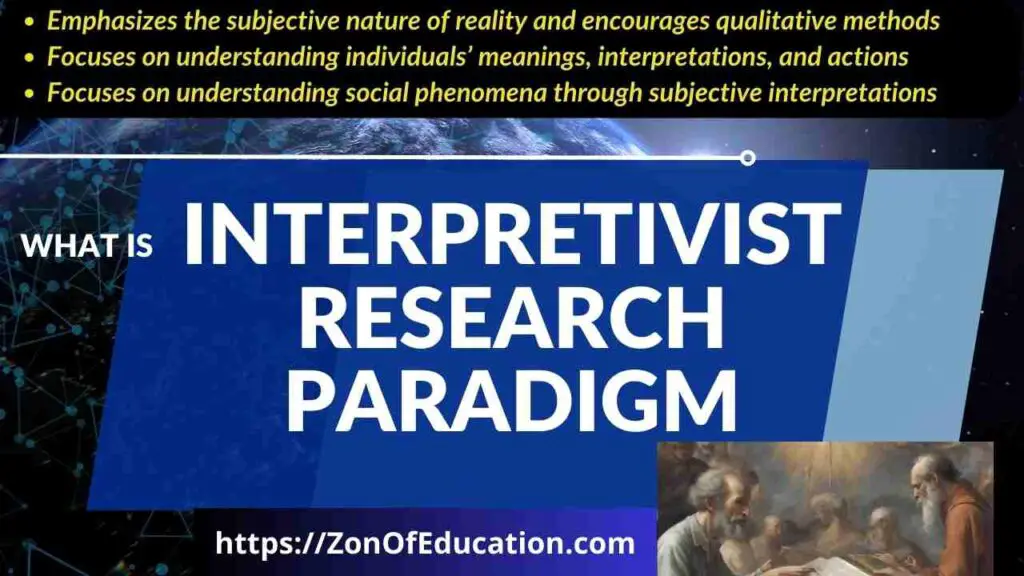Interpretivism Research Paradigm is a philosophical approach to social research that emphasizes the subjective nature of reality and encourages using qualitative methods to explore individuals’ meanings, interpretations, and actions. The Research Paradigm states that social reality is subjective and that methods of social inquiry should reflect this. It is a philosophical approach to research that focuses on understanding individuals’ meanings, interpretations, and actions and how those meanings, interpretations, and actions shape the social world. Interpretive research seeks to find the subjective meanings that people give to their actions and experiences.
- Interpretivism is a research paradigm that focuses on understanding social phenomena through subjective interpretations and meanings attributed to individuals.
- Interpretivism is a philosophical paradigm in research that focuses on studying social phenomena to uncover hidden realities within society.
- The interpretivist paradigm in research focuses on understanding subjective meanings and social constructs and using them as building blocks in theorizing.
This research paradigm contrasts with positivism, which takes an objective approach to research by using quantitative methods such as surveys and experiments to test hypotheses. Interpretive research typically includes qualitative methods such as interviews, observations, and focus groups, which help to reveal people’s underlying interpretations of their social world. This research approach is used to uncover the meanings, interpretations, and actions that shape the social world.
After reading this article, you will be able to:
- To understand the important components of the interpretivist paradigm
- To learn how the Interpretivist Paradigm differs from other approaches
- To examine the implications of the Interpretivist Paradigm for research
- To aonsider the strengths and weaknesses of the Interpretivist Paradigm
- To analyze how the Interpretivist Paradigm can be applied in different contexts
- To evaluate the usefulness of the interpretivist paradigm for addressing complex research questions
Interpretivism or the Interpretivist Research Paradigm
- The Interpretivist Research Paradigm is a qualitative research approach that seeks to understand social phenomena by examining subjective interpretations and experiences. It emphasizes the complexity of human experiences and perspectives and focuses on exploring and interpreting non-numeric data to uncover the depth and richness of individuals’ narratives.
- Interpretivism is a research approach that focuses on understanding phenomena through the meanings that people assign to them, emphasizing shared meanings and contextual knowledge.
- The interpretive paradigm in research aims to understand the reality of social life through subjective experiences and does not seek generalizations.
- The Interpretivist Paradigm differs from other approaches in its emphasis on subjective understanding and interpretive frameworks and on uncovering individuals’ lived experiences. When applied in research, it can yield meaningful and in-depth insights into social phenomena and provide a richer and more nuanced understanding of the complexities of the research topic.
Definition of Interpretivism
Interpretivism is a research paradigm that focuses on understanding the subjective elements of human behavior. It is based on the understanding that people interpret their experiences, and this interpretation shapes their behavior. To understand the core elements of the Interpretivist Paradigm, it is important to compare it to other approaches, such as positivism. Positivism is an empirical approach that relies on quantifiable data to explain the behavior of individuals. In contrast, Interpretivism relies on qualitative data to examine how people construct meaning.
Definition of Interpretivist Research Paradigm
Having discussed the background of Interpretivism, it’s time to delve into its definition.
The Interpretivist Research Paradigm is a qualitative approach that focuses on understanding social phenomena through subjective interpretations and emphasizing the complexity of human experiences and perspectives.
It seeks to uncover the depth and richness of individuals’ narratives and experiences and to explore and describe the essence of lived experiences perceived by those involved. It puts subjective understanding at its core, acknowledging that comprehending phenomena requires looking at them through individuals’ perspectives and interpretations.
This approach is also heavily informed by Social Constructionism, which highlights the role of societal influences in shaping individuals’ perceptions and the socially constructed nature of reality. It acknowledges the significance of the context in which phenomena occur. It encourages researchers to immerse themselves in the participants’ cultural context to understand their behaviors and practices deeply.

Interpretivism vs. Positivism
The Interpretivist Research Paradigm has distinct advantages over other approaches, particularly when compared to the positivist perspective. To understand the core of the Interpretivist Paradigm and contrast it with other approaches, it is important to examine the implications of the Interpretivist Paradigm for research, consider the strengths and weaknesses of the Interpretivist Paradigm, analyze how the Interpretivist Paradigm can be applied in different contexts, and evaluate the usefulness of the Interpretivist Paradigm for addressing complex research questions.
The following table highlights the differences between Interpretivism and Positivism:
| Interpretivism | Positivism |
|---|---|
| Subjective understanding | Objective understanding |
| Qualitative inquiry | Quantitative inquiry |
| Phenomenological approach | Hypothetico-deductive approach |
| Social constructionism | Objectivism |
| Contextual understanding | Universal laws |
| Aspect | Positivism | Interpretivism |
|---|---|---|
| Ontology | Objective reality exists independently of our perceptions. There is a single, objective truth. | Reality is subjective and multiple realities exist. Reality is socially constructed. |
| Epistemology | Knowledge is discovered through empirical observation and scientific methods. Emphasizes objectivity and quantifiable data. | Knowledge is constructed through interpretation, understanding, and context. Emphasizes subjectivity and qualitative data. |
| Methodology | Emphasis on quantitative methods such as experiments, surveys, and statistical analysis. Seeks to establish causal relationships. | Prefers qualitative methods such as interviews, observations, and case studies. Focuses on understanding meaning and context. |
| Role of Researcher | Objective and detached observer. Aims for neutrality and tries to minimize personal biases. | Acknowledges the influence of the researcher on the research process. Subjectivity and the researcher’s perspective are valued. |
| Generalizability | Seeks to generalize findings to broader populations. Emphasis on external validity. | Emphasizes in-depth understanding of specific cases. Findings may not be easily generalizable but provide rich, contextual insights. |
| Use of Theory | Strong reliance on established theories. Theory guides research and helps formulate hypotheses. | Open to emerging theories and emphasizes the development of new theories from data. Focus on understanding context-specific phenomena. |
| Purpose of Research | Objective measurement and prediction. Aims for universal laws and principles. | In-depth understanding and exploration of social phenomena. Seeks to uncover meanings, values, and perspectives. |
Foundations of Interpretivism
Building on the previous section, let’s explore the Foundations of Interpretivism. The Interpretivist Research Paradigm is based on several important components, including Subjective Understanding and Social Constructionism. This approach emphasizes the importance of looking at phenomena through the individual’s experiences, perceptions, and interpretations. It also acknowledges the role of societal factors in shaping individuals’ perceptions and understanding of reality.
The Interpretivist Paradigm is distinct from Positivism, which focuses on using empirical evidence and quantitative methods to gain knowledge. Unlike the Positivist approach, Interpretivism seeks to understand the complexity of an issue by delving into the subjective accounts and perspectives of individuals involved in the phenomenon.
Interpretivism can have far-reaching implications for research. Scholars who embrace this approach must learn to understand the important components of the Interpretivist Paradigm, explore how it differs from other research paradigms, and evaluate the usefulness of this approach for addressing complex research questions.
Principles of Interpretivism
Interpretivism is a research approach that seeks to understand the important components of a phenomenon from the perspective of those directly involved. It differs from positivist approaches by emphasizing the subjective nature of understanding and recognizing that meanings are emergent and contextual. This means that researchers must be aware of their subjectivity when interpreting data and remain open to the possibility that the meanings of a phenomenon can change over time.
Emergent Nature of Meaning
An important tenet of the Interpretivist Paradigm is the emergent nature of meaning. This concept recognizes that meaning is not fixed or predetermined but constructed in the interaction between the researcher and the research participants. This means that the researcher’s presence and interpretation of the data are essential in understanding the deeper meanings of the research. Thus, the Interpretivist Paradigm calls for researchers to be open, reflexive, and aware of the power dynamics in the research process. Through this approach, researchers can gain a nuanced and holistic understanding of the phenomenon being studied, allowing them to uncover the complexities inherent in the data.
Contextual Understanding in Interpretivist Paradigm
Building upon the definition of Interpretivism, it is important to understand the important components of the Interpretivist Paradigm. A central principle of this approach is Contextual Understanding, which acknowledges the significance of the environment in which phenomena occur, emphasizing the need for an in-depth exploration of the surroundings. Interpretivist researchers focus on how context shapes individuals’ behaviors, beliefs, and interpretations to gain a holistic understanding of a phenomenon. This approach emphasizes the interconnectedness of various factors and acknowledges that the reality of any phenomenon is socially constructed. It is also important to
- Learn how the Interpretivist Paradigm differs from other approaches,
- Examine the implications of the Interpretivist Paradigm for research,
- Consider the strengths and weaknesses of the Interpretivist Paradigm,
- Analyze how the Interpretivist Paradigm can be applied in different contexts,
- Evaluate the usefulness of the Interpretivist Paradigm for addressing complex research questions.
Subjectivity of the Researcher
Building upon the definition of Interpretivism, it is important to examine the important components of this research approach. One such tenet is the Subjectivity of the Researcher, which acknowledges that researchers play a fundamental role in interpreting the data. As such, the interpretations and conclusions drawn from research conducted within the Interpretive Paradigm are shaped not only by the data but also by the researcher’s subjective biases, perspectives, and assumptions. This means that the researcher’s role in the research process is to gather and analyze data and reflect critically on their involvement in the research.
This emphasis on the researcher’s subjectivity has implications for the research process. Researchers must be mindful of their views and biases and open to alternative interpretations. This is especially important when interpreting qualitative data based on participants’ subjective experiences and perspectives.
Research Methods
Research Methods encompass various approaches, from Phenomenology to Grounded Theory and Ethnography. To understand the important components of the Interpretivist Paradigm, it is important to learn how it differs from other approaches and examine the implications for research. We need to consider the Interpretivist Paradigm‘s strengths and weaknesses and analyze how it can be applied in different contexts. Finally, we must evaluate the usefulness of the Interpretivist Paradigm for addressing complex research questions.
Building on the principles of Interpretivism, let’s now examine how this approach can be applied in research. In particular, we will look closely at Grounded Theory, phenomenology, and ethnography, three of the most widely used research methods in the Interpretivist Paradigm.
Phenomenology
Transitioning from the principles of Interpretivism to its research methods, Phenomenology is an important component of the Interpretivist Research Paradigm. It focuses on exploring and describing the essence of an individual’s lived experiences as perceived by themselves. The goal is to understand deeply how that individual interprets and makes sense of their environment. To this end, hermeneutics and verstehen, or empathetic understanding, are integral components of phenomenology. They involve interpreting texts or expressions and grasping the meanings and motives attributed to a person’s actions and experiences. Furthermore, symbolic interactionism is also relevant as it emphasizes the role of symbols and interactions in constructing meaning. By considering these aspects, researchers can uncover the complexities and nuances of the phenomenon under investigation.
Grounded Theory
Grounded Theory is a qualitative research method that seeks to generate new theories from inductive data analysis. It emphasizes the importance of an open-ended approach to research, allowing for the emergence of new theoretical insights and interpretations. This method involves constant data comparison, allowing for the identification of patterns and the gradual refinement of theoretical propositions. Grounded Theory is particularly useful for exploring the complexities of social phenomena, as it allows researchers to consider multiple perspectives and interpretations.
Overall, the Interpretivist Paradigm offers a powerful framework for exploring the complexities of social phenomena. Researchers can better understand individuals’ experiences, interpretations, and behaviors by incorporating qualitative methods such as Grounded Theory, phenomenology, and ethnography.
Ethnography
Building upon the core components of Interpretivism, researchers can utilize several research methods to examine and interpret social phenomena. One such approach is Ethnography, which is used to gain a deep understanding of a particular culture or group. Ethnography involves immersing the researcher in the participants’ cultural context and engaging in meaningful conversations to uncover their behaviors, practices, and interpretations of the phenomenon under study. This strategy allows researchers to gain insights from the insider perspective and develop a nuanced, holistic understanding of the phenomenon. Ethnography can be especially useful for exploring complex topics, as it allows researchers to uncover the contextual factors that shape individuals’ experiences. Furthermore, it enables researchers to analyze how individuals interact with and interpret symbols within their social environment, providing valuable insights into the meanings and motivations that drive their actions.
Advantages of Interpretivism
Interpretivism is a philosophical stance that involves a detailed understanding of social reality and an improved understanding of complex phenomena. It provides insight into human experience by examining the core tenets of the Interpretivist Paradigm and learning how it differs from other approaches. This helps researchers better comprehend and evaluate the implications of the Interpretivist Paradigm for research.
Moreover, Interpretivism helps researchers analyze the strengths and weaknesses of this approach and how it can be applied in different contexts. This allows for considering the usefulness of the Interpretivist Paradigm for addressing complex research questions.
Detailed Understanding of Social Reality
The Interpretivist Research Paradigm allows for a detailed understanding of social reality. By focusing on subjective interpretations and emphasizing the complexity of human experiences, Interpretivist researchers can gain an in-depth understanding of phenomena. This approach encourages researchers to engage in meaningful conversations with participants, explore the surrounding environment, and consider the cultural context, allowing for a holistic understanding of the complexities of social reality. Furthermore, Interpretivist Research enables researchers to gain insight into individuals’ lived experiences, uncover the richness of their narratives, and explore the meanings and motives that individuals attribute to their actions. To gain these insights, researchers must understand the important components of the Interpretivist Paradigm and learn how it differs from other approaches. Additionally, they must consider the implications of the Paradigm for research, analyze how it can be applied in different contexts, and evaluate its usefulness for addressing complex research questions.
Improved Understanding of Complex Phenomena in Interpretivist Paradigm
The Interpretivist Research Paradigm provides a unique perspective on social phenomena, allowing researchers to understand complex phenomena better. This approach emphasizes understanding social reality through subjective interpretations, emphasizing the importance of comprehending phenomena from the perspective of those involved. By employing this paradigm, researchers are better equipped to make sense of the complex dynamics that shape individuals’ experiences.
The Interpretivist Paradigm can help researchers understand the important components of the Interpretivist Paradigm, learn how the Interpretivist Paradigm differs from other approaches, and examine the implications of the Interpretivist Paradigm for research. Additionally, it can help researchers consider the strengths and weaknesses of the Interpretivist Paradigm, analyze how the Interpretivist Paradigm can be applied in different contexts, and evaluate the usefulness of the Interpretivist Paradigm for addressing complex research questions.
In particular, this paradigm provides a deeper understanding of social phenomena by exploring the meanings and motivations that influence individuals’ interpretations and perceptions.
Insight Into Human Experience in Interpretivist Approach
The Interpretivist Research Paradigm offers significant insight into human experience and understanding of social reality. Adopting an interpretive approach allows researchers to understand the important components of the paradigm, learn how it differs from other approaches, and examine the implications of the interpretivism paradigm for research. Additionally, it is essential to consider the strengths and weaknesses of the interpretivist approach and analyze how it can be applied in different contexts. This will help researchers evaluate the usefulness of the interpretivist paradigm for addressing complex research questions.
When taking an interpretivist approach, researchers focus on subjective and contextual understanding to gain insight into the meanings and motives individuals attribute to their actions. Moreover, scholars utilize ethnographic research, symbolic interactionism, idiographic analysis, and narrative inquiry to understand human experience comprehensively.
Disadvantages of Interpretivism
Interpretivism, also known as “interpretive research” or “qualitative research,” is an approach to understanding social phenomena. It seeks to understand the important components of the Interpretivist Paradigm, which includes understanding the social context of an event or phenomenon and its meaning for those involved. This approach differs from others, focusing on personal meanings, beliefs, and experiences rather than objective scientific facts.
One of the main disadvantages of Interpretivism is the inability to test hypotheses.
Inability to Test Hypotheses
The Interpretivist Research Paradigm has its strengths, but it also has its drawbacks. One of the main disadvantages of Interpretivist Research is its inability to test hypotheses. Interpretive Research aims to gain subjective insights into a phenomenon instead of testing specific hypotheses. Thus, the results of Interpretivist Research are often more qualitative than quantitative, making it difficult to make generalizations. Additionally, because Interpretivist Research emphasizes subjective interpretation, it can be difficult to replicate the same results in different contexts.
Ultimately, the Interpretivist Research Paradigm can be an effective approach for gaining deeper insights into complex social phenomena. However, its inability to test hypotheses and the subjective nature of its results can limit its usefulness in some research contexts. Therefore, researchers need to evaluate the strengths and weaknesses of the Interpretivist Research Paradigm when considering which research approach to use.
Subjective Nature of Results
One of the primary disadvantages of the Interpretivist Research Paradigm is the subjective nature of the results. By emphasizing the importance of understanding phenomena through individuals’ perspectives and interpretations, interpretive research often relies heavily on subjective interpretations of data, which can be difficult to verify. Understand the important components of the interpretive paradigm and learn how it differs from other approaches to recognize the implications of this approach for research.
The Interpretivist Research Paradigm can also make generalizing findings to a larger population challenging. By focusing on the unique aspects of individual cases, researchers may be limited in their ability to draw broader conclusions. It is important to consider the strengths and weaknesses of the Interpretivist Research Paradigm to assess its usefulness for addressing complex research questions.
Challenges with Generalizability
One of the main challenges with Interpretivism is its difficulty in generalizability. While Interpretivism is designed to explore the intricacies of individual cases and experiences, the findings may remain unique to the individual or context. Thus, they cannot be generalized to a wider population. This means that the results of Interpretivist Research may not apply to a broader context. As such, making generalizable claims about the population or phenomenon being studied can be difficult. Furthermore, the reliance on subjective interpretations can lead to potential bias in the results, making it difficult to draw generalized conclusions. Additionally, the lack of replicability and quantitative data can make it difficult to validate the results of Interpretive Research.
Despite these difficulties, the Interpretivist Research Paradigm can be a powerful tool for gaining insight into complex phenomena. Interpretivism can provide a valuable perspective on the human experience when combined with other research methods.
Examples of Interpretive Research Paradigm
Interpretivism is a research approach that aims to understand the subjective experience of individuals in various contexts. It is distinct from other research approaches in its focus on the meaning individuals attach to their experiences and the importance of understanding the context to interpret these experiences. In exploring the user experience of technology, examining the impact of mental health stigma, and investigating group dynamics in organizations, Interpretivism can be applied to gain insight into individuals’ varied perspectives and experiences.
Interpretive research in the realm of education employs a paradigm that seeks to delve into the subjective meanings and interpretations individuals ascribe to educational experiences. Here are illustrative examples showcasing the application of the interpretive research paradigm in educational research:
- Understanding Student Perceptions of Inclusive Education
Objective: Investigate how students perceive and interpret the concept of inclusive education.
Methodology: Conduct in-depth interviews and focus group discussions to explore students’ experiences, feelings, and interpretations of inclusion within the educational setting.
Key Focus Areas: Individual narratives, personal experiences, and the social construction of inclusivity. - Exploring Teachers’ Pedagogical Decision-Making Processes
Objective: Uncover the subjective factors influencing teachers’ decisions in the classroom.
Methodology: Employ ethnographic observations and interviews to understand how teachers interpret various teaching situations, make instructional choices, and navigate the complexities of the educational environment.
Key Focus Areas: Teacher beliefs, values, and the socio-cultural context shaping pedagogical decisions. - Investigating Parental Perspectives on Homeschooling
Objective: Examine how parents interpret and navigate the homeschooling experience.
Methodology: Utilize surveys, interviews, and document analysis to gather insights into parents’ motivations, perceptions, and interpretations of the homeschooling journey.
Key Focus Areas: Parental roles, beliefs about education, and the social construction of alternative education. - Analyzing Student-Teacher Relationships in Early Childhood Education
Objective: Explore the subjective nature of relationships between young students and their teachers.
Methodology: Employ case studies and narrative analysis to understand the interpretive frameworks through which both students and teachers perceive and engage in relationships within early childhood educational settings.
Key Focus Areas: Trust, communication, and the social construction of the student-teacher dynamic. - Interpreting the Impact of Technology on Learning Motivation
Objective: Investigate how students interpret the influence of technology on their motivation to learn.
Methodology: Combine surveys, interviews, and classroom observations to gather data on students’ perceptions of how technology shapes their educational experiences and engagement.
Key Focus Areas: Student attitudes, motivations, and the evolving nature of technology-mediated learning. - Examining Cross-Cultural Perspectives on Educational Leadership
Objective: Understand how educational leaders interpret their roles and responsibilities in diverse cultural contexts.
Methodology: Conduct cross-cultural case studies and interviews with educational leaders from different cultural backgrounds to explore the varied interpretations of effective leadership.
Key Focus Areas: Cultural influences, leadership styles, and the social construction of leadership efficacy.
These examples illustrate the versatility of the interpretive research paradigm in capturing the nuanced and subjective aspects of educational phenomena. The focus is on unraveling the meanings individuals attribute to their educational experiences, contributing to a richer understanding of the complex dynamics within educational settings.
Interpretive Research Paradigm in Education
Interpretive research within the field of education constitutes a multifaceted and nuanced paradigm that fundamentally seeks to unravel the subjective meanings and interpretations individuals associate with educational phenomena. This paradigm, deeply rooted in the philosophy of understanding the lived experiences of participants, diverges from more traditional, positivist approaches by emphasizing the importance of context, individual perspectives, and the socially constructed nature of reality.
Interpretive research, often termed qualitative or constructivist, operates on the premise that reality is socially constructed. This paradigm contends that individuals bring their unique perspectives, values, and experiences to the educational context, shaping their understanding and interpretation of educational phenomena. In education, this could encompass a broad spectrum of subjects, including student experiences, teacher practices, curriculum design, and institutional policies.
Interpretive research places a significant emphasis on exploring the subjective experiences and interpretations of participants. This involves delving into the rich tapestry of individual perspectives to uncover the diverse ways in which individuals make sense of educational phenomena.
Contextual Embeddedness:
The contextual nature of educational settings is a focal point in interpretive research. Researchers strive to understand the intricacies of the educational context, acknowledging that meanings and interpretations are deeply embedded in the social and cultural fabric of the environment.
Qualitative research methods, such as in-depth interviews, focus group discussions, participant observations, and document analysis, are frequently employed. These methods allow researchers to capture the depth and complexity of educational experiences.
Interpretive research recognizes the dynamic and iterative nature of the research process. Researchers engage in continuous cycles of data collection, analysis, and reflection to refine their understanding of the phenomena under investigation.
Applications of Interpretive Research in Education:
Understanding Student Perspectives:
Interpretive research has been instrumental in uncovering the nuanced perspectives of students. This could involve exploring their attitudes toward learning, perceptions of classroom dynamics, or experiences with particular pedagogical approaches.
Researchers employing the interpretive paradigm often investigate the intricate decision-making processes of teachers. This includes understanding how teachers interpret and navigate the complexities of their roles, make instructional choices, and respond to the diverse needs of their students.
Interpretive research extends its reach to the institutional level, examining the culture and climate of educational institutions. This could involve investigating the interpretation and implementation of policies, the dynamics of leadership, and the overall ethos of the learning environment.
The emphasis on subjectivity in interpretive research raises concerns about potential bias. Researchers must be vigilant in acknowledging their own perspectives and taking steps to mitigate bias in data collection and analysis.
Generalizability Concerns:
Critics often highlight challenges in generalizing findings from interpretive research due to its focus on context-specific meanings. Researchers must carefully consider the transferability of their findings to other settings.
Interpretive Research Paradigm in Educational Research
The core pursuit of the Interpretivist paradigm revolves around delving into the subjective realms of human experience (Guba & Lincoln, 1989). It is an earnest endeavor to inhabit the mental space of the subjects under scrutiny, aiming to comprehend and interpret the thoughts or meanings they ascribe to their context. Rather than adopting the viewpoint of the observer, the focus lies on grasping the perspective of the observed subject. The paramount tenet of this paradigm posits that reality is socially constructed, hence its occasional moniker, the Constructivist paradigm (Bogdan & Biklen, 1998).
In the Interpretivist paradigm, the theory doesn’t precede research; instead, it emerges grounded in the data generated by the research act. Following this paradigm involves gathering and analyzing data akin to the principles of grounded theory (Strauss & Corbin, 1990). The paradigm embraces a subjectivist epistemology, a relativist ontology, a naturalist methodology, and a balanced axiology. These elements are succinctly elucidated below.
Epistemological Underpinnings: Subjective Construction
A subjectivist epistemology assumes that researchers derive meaning from data through personal cognitive processes, informed by interactions with participants. The researcher is seen as constructing knowledge socially, influenced by real-life experiences within the natural settings investigated (Punch, 2005). Interactive processes between the researcher and subjects involve a dynamic exchange encompassing dialogue, questioning, listening, reading, writing, and recording research data.
Ontological Perspective: Embracing Relativism
A relativist ontology asserts that the studied situation harbors multiple realities, which can be explored and reconstructed through human interactions between the researcher and subjects, as well as among the research participants (Chalmers, Manley & Wasserman, 2005).
Methodological Approach: Naturalist Inquiry
The naturalist methodology in this paradigm involves utilizing data gathered through interviews, discourses, text messages, and reflective sessions, with the researcher acting as a participant observer (Carr & Kemmis, 1986). This approach acknowledges the contextual nuances inherent in the study of human behavior.
Axiological Balance: Reflecting Values
A balanced axiology assumes that the research outcome reflects the values of the researcher, striving to present a nuanced and balanced report of the findings.
Characteristics of Research within the Interpretivist Paradigm
Research conducted under the Interpretivist paradigm typically exhibits the following characteristics, as articulated by Lincoln and Guba (1985) and Morgan (2007):
- Recognition of the incomprehensibility of the social world from an individual standpoint.
- Belief in the multiplicity and social construction of realities.
- Acknowledgment of the inevitable interaction between the researcher and research participants.
- Recognition of the vital role of context in knowledge acquisition.
- Acknowledgment that knowledge creation is influenced by findings and may carry values that need explicit articulation.
- Emphasis on understanding individuals rather than universal laws.
- Belief in the interdependence of causes and effects.
- Recognition that contextual factors must be considered systematically for a comprehensive understanding.
Criteria for Validating Research within the Interpretivist Paradigm
Guba (1981) suggests replacing positivist criteria with four criteria of trustworthiness and authenticity: credibility, dependability, confirmability, and transferability.
Credibility: The Essence of Believability
In the Interpretivist paradigm, credibility pertains to the extent to which data and analysis are deemed believable, trustworthy, or authentic (Guba, 1981). It addresses the alignment of findings with the constructed reality of the researcher and research participants.
Dependability: Navigating Continuously Variable Realities
Dependability replaces the reliability criterion of the Positivist paradigm, focusing on the ability to observe similar outcomes or findings under similar circumstances. Given the continuously variable nature of human behavior, the interpretivist researcher cannot precisely reproduce results but can make dependable inferences based on their construction of meaning.
Confirmability: Mitigating Researcher Bias
Confirmability takes precedence over objectivity in the Interpretivist paradigm, emphasizing the extent to which others in the field can confirm the research findings. The goal is to minimize, if not eliminate, biases from contaminating the results.
Transferability: Contextualizing Insights
Transferability replaces external validity, emphasizing the researcher’s responsibility to provide sufficient contextual data so that readers can relate the findings to their own contexts. While subject to controversy, it remains crucial to understand the contextual specificity of interpretivist research (Guba, 1981; Lincoln & Guba, 1985; Erlandson et al., 1993; Gomm et al., 2000).
Investigating Group Dynamics in Organizations
Transitioning from discussing the disadvantages of interpretivism, it is essential to consider practical examples of how the Interpretivist Paradigm can be applied in research. One of the key applications of the Interpretivist Paradigm is investigating group dynamics in organizations. Through this approach, researchers can Understand the important components of the Interpretivist Paradigm, Learn how the Interpretivist Paradigm differs from other approaches, and Examine the implications of the Interpretivist Paradigm for research. Additionally, it is important to Consider the strengths and weaknesses of the Interpretivist Paradigm, Analyze how the Interpretivist Paradigm can be applied in different contexts, and Evaluate the usefulness of the Interpretivist Paradigm for addressing complex research questions.
For example, a researcher may explore how group dynamics, such as team collaboration and communication, affect organizational performance.
Principles for Effective Interpretivist Research
Open-mindedness, Attention to Detail, and Respect for Participants are essential for effective Interpretivist research. Understand the important components of the Interpretivist Paradigm and learn how it differs from other approaches to ensure that the research is conducted ethically and responsibly. It is also important to examine the implications of the Interpretivist Paradigm for research to ensure that the results are meaningful and accurate. Additionally, it is important to consider the strengths and weaknesses of the Interpretivist Paradigm to ensure that the research is conducted effectively and efficiently.
Open-Mindedness
To effectively conduct interpretive research, open-mindedness is essential. Researchers must be willing to consider different perspectives, understanding the important components of the interpretive paradigm and how it differs from other approaches. They must also examine the implications of the interpretive paradigm for research, considering its strengths and weaknesses and analyzing how it can be applied in different contexts. Evaluating the usefulness of the interpretive paradigm for addressing complex research questions is also necessary. By maintaining an open-minded approach, researchers can ensure their research is rigorous and meaningful. Open-mindedness is key to meaningful interpretive research, as it allows researchers to see the bigger picture and recognize the complexities and nuances of a phenomenon. By acknowledging the subjective nature of interpretation, researchers can be more aware of their biases and assumptions and how these might affect their interpretation of data.
Attention to Detail
Attention to Detail is an essential principle for effective Interpretivist Research. Researchers must be attentive to the nuances of each case to adequately understand the experiences and interpretations of those involved in the phenomenon. Developing a holistic understanding of the phenomenon’s context is necessary, exploring the different perspectives, structures, and meanings that shape individuals’ experiences and interpretations. Researchers should pay attention to detail when collecting data, ensuring they capture the full scope and breadth of information relevant to the phenomenon. They should also be attentive to how their biases, assumptions, and perspectives can influence the data collection process and the interpretation of results. Lastly, researchers must respect the participants and their stories, understanding their experiences as valid and meaningful.
Respect for Participants
Respect for Participants is an integral part of the Interpretivist Research Paradigm. Researchers need to approach research participants with respect, understanding, and empathy. Creating a safe and secure environment for participants is important, ensuring that their stories and experiences will be heard and valued. Furthermore, ensuring that participants are treated fairly and their data is protected and safeguarded is important.
It is also important to understand the Interpretivist Paradigm’s important components and learn how it differs from other research approaches. For instance, the Interpretivist Paradigm emphasizes the importance of subjective understanding, social constructionism, and hermeneutics. It is also important to examine the implications of the Interpretivist Paradigm for research, considering the strengths and weaknesses of the approach. Additionally, researchers must analyze how the Interpretivist Paradigm can be applied in different contexts and evaluate its usefulness for addressing complex research questions.
Respect for Participants is an essential component of the Interpretivist Research Paradigm.
The Future of Interpretivist Research
The Future of Interpretivist Research includes potential applications, data collection advances, and technology’s role. To understand the important components of the Interpretivist Paradigm and learn how it differs from other approaches, researchers must examine the implications for research, analyze strengths and weaknesses, and consider how it can be applied in different contexts. Data collection methods must be improved to evaluate the usefulness of the Interpretivist Paradigm. Advances in data collection could include digital tools, such as online surveys, social media, or mobile apps, as well as traditional methods, such as interviews and focus groups.
Potential Applications of Interpretivist Research
Having discussed the core principles of Interpretivist Research, it is now time to consider the potential applications of this approach. As a research paradigm, Interpretivist Research provides an invaluable tool for researchers looking to gain insight into the complexities of social phenomena. Researchers can gain a more nuanced and comprehensive understanding of the various social contexts, meanings, and interpretations attributed to a particular phenomenon by utilizing qualitative methods such as Narrative Inquiry, Reflexivity in Research, and Symbolic Interactionism.
In addition, the Interpretivist Paradigm allows researchers to gain a more holistic view of a phenomenon, taking into account the individual perspectives of participants and the larger societal and cultural influences that shape their interpretations. Furthermore, the Interpretivist Paradigm allows researchers to explore the implications of a phenomenon in various contexts, examining how the same phenomenon can be perceived differently depending on the cultural and historical environment.
Advances in Data Collection
Building on the principles of Interpretivist Research discussed in the previous section, advances in data collection and the role of technology offer potential opportunities for furthering the field. While traditional data collection methods such as interviews, surveys, and observations remain relevant, technological innovations have enabled researchers to collect data innovatively. For example, the use of digital technology has opened the door to collecting data in virtual environments. In contrast, social media platforms can collect data on attitudes, behaviors, and experiences.
Moreover, understanding the important components of the Interpretivist Paradigm, such as Subjective Understanding and Hermeneutics, can help researchers develop more robust data collection practices. By learning how the Interpretivist Paradigm differs from other approaches, researchers can develop data collection methods that are tailored to the unique needs of an Interpretivist research project, allowing them to uncover the complex meanings and interpretations associated with a phenomenon more effectively.
The Role of Technology
As our understanding of the Interpretivist Research Paradigm evolves, it is important to consider the role of technology in its continued development. Technology has the potential to both enable and impede the process of uncovering the complexities of social phenomena. On the one hand, technology can provide powerful tools for data collection, allowing researchers to gather and analyze a large amount of qualitative data quickly and efficiently. On the other hand, technology can create barriers to understanding, as the use of algorithmic and automated data collection methods can lead to a lack of contextual understanding and a loss of nuance.
Technology can also provide new opportunities for researchers to engage with participants, allowing for a deeper understanding of the phenomenon being studied and creating new ethical considerations. Technology-mediated methods of data collection, such as virtual interviews and online surveys, can enhance the research process while allowing for the preservation of anonymity and the protection of participant privacy.
Summary
The Interpretivist Research Paradigm is an important framework for understanding and analyzing qualitative research. It emphasizes the importance of understanding the context and meanings people ascribe to their actions and experiences. By examining the important components, methods, and implications of the Interpretivist Paradigm, researchers can learn how to apply this approach to their research. With a deep understanding of the strengths and weaknesses of the Interpretivist Paradigm, researchers can evaluate the usefulness of this framework for addressing complex research questions. With the right principles in place, the Interpretivist Paradigm can be a powerful tool for understanding the social world.
- Emphasizes the subjective nature of reality and encourages qualitative methods
- Focuses on understanding individuals’ meanings, interpretations, and actions
- Focuses on understanding social phenomena through subjective interpretations
- The philosophical paradigm that uncovers hidden realities within society
- Positivism takes an objective approach using quantitative methods
- Interpretive research typically includes qualitative methods
- Emphasizes shared meanings and contextual knowledge
- Utilizes a dialogical approach to co-construct knowledge
- Emphasizes the importance of subjective understanding
- Acknowledges societal factors in shaping individuals’ perceptions
- Meaning is constructed in the interaction between the researcher and the participants
- Researchers must be open, reflexive, and aware of power dynamics
- Acknowledges the significance of the environment in which phenomena occur
- Emphasizes the interconnectedness of various factors
- Researchers play a fundamental role in interpreting the data
- Emphasis on researchers being open to alternative interpretations
- Hermeneutics and verstehen are integral components of phenomenology, involving the interpretation of texts and grasping meanings and motives attributed to a person’s actions and experiences.
- Symbolic interactionism is relevant as it emphasizes the role of symbols and interactions in constructing meaning.
- Grounded Theory is a qualitative research method seeking to generate new theories from inductive data analysis.
- It allows for the emergence of new theoretical insights and interpretations through constant data comparison.
- Ethnography is used to gain a deep understanding of a particular culture or group.
- It allows for the immersion of the researcher in the participants’ cultural context, gaining insights from an insider perspective.
- Interpretivism provides insight into human experience through a detailed understanding of social reality.
- It offers a unique perspective on social phenomena, enabling researchers to understand complex dynamics that shape individuals’ experiences.
- Interpretivism provides a deeper understanding of social phenomena by exploring the meanings and motivations that influence individuals’ interpretations and perceptions.
- It allows for a comprehensive understanding of human experience through various research methods.
- Adopting an interpretive approach allows researchers to gain significant insight into human experience and social reality.
- It focuses on personal meanings, beliefs, and experiences rather than objective scientific facts.
- The inability of interpretivism to test hypotheses is a major drawback.
- The subjective nature of results and challenges with generalizability are also significant disadvantages.
- Interpretivism is distinct in its focus on the meaning individuals attach to their experiences.
- It can be applied in exploring the user experience of technology, examining mental health stigma, and investigating group dynamics in organizations.
- Researchers can understand the components of the Interpretivist Paradigm and its differences from other approaches.
- They can also examine the implications of the Interpretivist Paradigm for research and consider its strengths and weaknesses.
- Open-mindedness, attention to detail, and respect for participants are essential for effective Interpretivist research.
- Researchers should learn how the Interpretivist Paradigm differs from other research approaches and examine its implications.
- Researchers must consider different perspectives and the subjective nature of interpretation.
- An open-minded approach allows for rigorous and meaningful interpretive research.
- Researchers need to understand the nuances and contexts of each case.
- Attention to detail ensures a holistic understanding and respects participants’ experiences.
- Approaching participants with respect, understanding, and empathy is crucial.
- Creating a safe environment and safeguarding participants’ data are important elements.
- Understanding the components, strengths, and weaknesses of the Interpretivist Paradigm is crucial.
- Researchers need to examine its implications and consider potential applications and advances in data collection.
- Interpretivist Research offers insights into social complexities through qualitative methods.
- It allows for exploring how phenomena are perceived in different cultural and historical contexts.







bookmarked!!, І like your blog!
[…] if you can imagine aspects of research paradigms, interpretivism would sit more or less on the opposite side of the spectrum from positivism […]
[…] historical evolution of the philosophy of pragmatism, embracing a diverse range of methods. This paradigm is evolved by the belief that researchers should employ the philosophical or methodological […]
[…] the right research paradigm is important in research because, for researchers, a paradigm shapes how we see the world and what […]